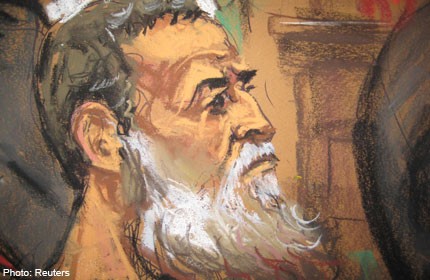Libi health 'fine', US defence asks for 6 months

NEW YORK CITY - The Libyan Al-Qaeda suspect recently captured by US troops was back in a New York courtroom Tuesday where his lawyer demanded at least six months to prepare his defence.
Anas al-Libi, 49, has pleaded not guilty to conspiracy charges over the 1998 Al-Qaeda bombings of US embassies in East Africa that killed 244 people and wounded more than 5,000 others.
He was detained by US commandos in the Libyan capital on October 5 and brought to New York, where he was indicted in 2000 to face trial, after being interrogated on board a US warship.
Libi suffers from hepatitis C, a condition of the liver, but has received treatment and his health is "fine," his lawyer Bernard Kleinman told reporters.
He denied claims from Libi's son Abdullah al-Raghie that he was on hunger strike and reports that he had cirrhosis of the liver.
Throughout the hearing, Libi remained fixed ahead. At times he looked tired and worried, squinting his eyes in concentration.
He spoke only once, pulling a microphone towards him to say yes in Arabic when asked if he was satisfied with his legal representation.
The prosecution said it had two computer hard drives and 35 DVDs of 275,000 unclassified documents and 10 boxes of classified evidence.
Kleinman said he would need "at least six months" to go through all the evidence and to consult his client, whom he said he had met for the first time only earlier on Tuesday.
The government requested Tuesday that Libi be tried jointly with two other suspects indicted on the same charges - Khalid al-Fawwaz and Adel Abdel Bary - given overlapping evidence and witnesses.
Lawyers for the other two suspects said they would need time to consider the request. Kleinman said he would not be able to make decision until after going through the evidence.
"I don't want to feel rushed. I want to make sure Mr al-Libi gets the best representation," he told the court.
Judge Lewis Kaplan said he would reflect later on a joint trial but indicated that he would be included to accept.
He set December 12 as the next hearing.
Kleinman told reporters that Libi had a "fine" and "halal diet" in custody and was taking medication for his condition.
Libi pleaded not guilty on October 15 to charges that he conspired to murder, kidnap, maim, kill, destroy property and attack US defence buildings.
The charges do not carry the death penalty.
The August 7, 1998 car bombing of the US embassy in Nairobi killed 213 people and wounded another 5,000.
A near simultaneous truck bomb outside the US mission in Tanzania killed 11 people and wounded 70 more.
The computer expert had been on the FBI's most wanted list with a US$5 million (S$6.17 million) price on his head.
The 2000 accuses him in 1993 of discussing possible attacks against the US embassy in Nairobi, and of carrying out surveillance of the diplomatic mission.
In or around 1994, it says, he received files concerning possible attacks against the embassy, the US Agency for International Development, and British, French and Israeli targets in Nairobi.
Libi's capture embarrassed Libya and put it under pressure from its critics, notably former rebel groups from the 2011 revolt that ousted leader Muammar Gaddafi.
Kleinman said Libi was "shocked" at having been "kidnapped" without proper legal procedure and "upset" over his interrogation.
"He doesn't really understand what's going on," Kleinman said.
He also asked for the return of Libi's Quran, annotated with personal religious notes, that was confiscated after his capture.